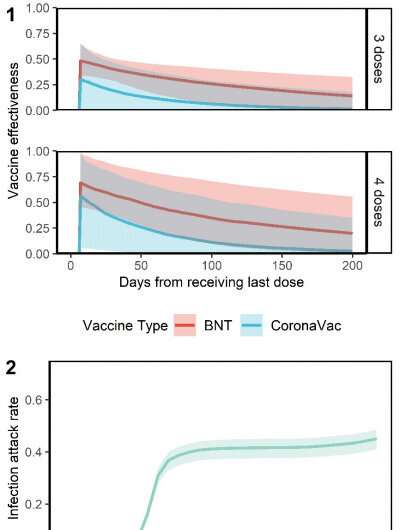This article has been reviewed according to Science X's editorial process and policies. Editors have highlighted the following attributes while ensuring the content's credibility:
fact-checked
peer-reviewed publication
trusted source
proofread
Study reveals three or four doses of mRNA vaccines remain effective in preventing omicron infection

An international research team has provided one of the first real-world estimates of vaccine effectiveness against omicron infections, irrespective of symptoms or severity. From a serological survey of 5,310 blood donors and other volunteers, the researchers estimated that three doses of the Comirnaty or CoronaVac vaccines were, respectively, 48% or 30% effective in preventing omicron infection shortly after vaccination, further improving shortly after a fourth dose.
The researchers expected protection from infection also relates to protection from transmission, and this is one of the first reports suggesting vaccine-induced protection from omicron virus transmission. However, vaccine effectiveness waned rapidly thereafter over 100 days. Moreover, the researchers estimated that more than 45% of the Hong Kong population was infected between 1 January and 31 July 2022. These findings have been published in Nature Medicine.
The SARS-CoV-2 omicron variant has demonstrated enhanced transmissibility and escape of vaccine-derived immunity. Between 1 January to 31 July 2022, Hong Kong experienced an unprecedented fifth wave of COVID-19 infections driven predominantly by the omicron BA.2 subvariant. As local COVID transmission before 2022 was minimal, population immunity to SARS-CoV-2 in Hong Kong was almost entirely vaccine-derived at the start of the wave.
There is extensive data on how COVID-19 vaccines robustly prevent severe disease, hospitalization and death. However, few studies have investigated their effectiveness in preventing omicron infections, irrespective of symptoms or severity. Prevention of infection itself indicates prevention of both asymptomatic and symptomatic disease transmission.
Combining results from a community-wide serological survey of 5,310 blood donors and volunteers with SARS-CoV-2 viral load data from city-wide wastewater surveillance, the researchers estimated, (i) vaccine effectiveness against all omicron BA.2 infections conferred by two, three and four homologous doses of the Comirnaty or CoronaVac vaccines for 100 days after each dose and (ii) COVID-19 infection attack rate in Hong Kong from 1 January to 31 July 2022. The researchers developed two in-house ELISA assays detecting IgG antibodies to the nucleocapsid (N) or Open Reading Frame 8 (ORF8) protein of SARS-CoV-2, with the latter assay developed specifically to detect past infection in CoronaVac vaccines.
The researchers estimated three and four doses of Comirnaty were 48% and 69% effective in preventing omicron infection, respectively, seven days after vaccination, waning to 26% and 35% by 100 days after vaccination. Three and four doses of CoronaVac were 30% and 56% effective after seven days respectively, declining to 6% and 11% by 100 days.
Meanwhile, the researchers identified that more than 45% of the local population in Hong Kong was infected by SARS-CoV-2 between 1 January and 31 July 2022 (i.e., an infection attack rate of 45%). Accordingly, official case counts, incorporating both Reverse Transcriptase-PCR (RT-PCR) testing and Rapid Antigen Testing (RAT) results, identified less than 41% of all infections.
The results indicate that booster vaccination using either the mRNA or inactivated vaccine platforms is effective in preventing SARS-CoV-2 omicron BA.2 infection in the short-term. This adds to previous studies demonstrating robust vaccine effectiveness in preventing severe disease and death.
Thus, surge booster campaigns, particularly with updated bivalent mRNA vaccines, could be strategically used to rapidly boost population immunity when there is risk of future waves of infections arising from a concerning novel virus variant. The comparatively lower infection attack rate in Hong Kong by July 2022, versus various overseas jurisdictions, highlights the effect of supplementing vaccination campaigns with continued public health and social measures (e.g., masking) on reducing disease transmission.
More information: Jonathan J. Lau et al, Real-world COVID-19 vaccine effectiveness against the Omicron BA.2 variant in a SARS-CoV-2 infection-naive population, Nature Medicine (2023). DOI: 10.1038/s41591-023-02219-5


















